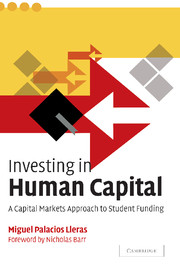Book contents
- Frontmatter
- Contents
- List of figures
- List of tables
- Foreword
- Acknowledgments
- Introduction
- Part I The problem of financing education
- 1 The value of education
- 2 Market failure in the financing of education
- 3 The need for alternatives to traditional funding
- Part II Equity-like investments to finance education
- Part III Implementing human capital contracts
- Appendix A Valuation of human capital contracts
- Appendix B Using human capital options to value income-contingent loans
- Appendix C Features of human capital contracts, income-contingent loans, and traditional mortgage-type loans
- Appendix D A developing country study
- Notes
- References
- Index
1 - The value of education
Published online by Cambridge University Press: 08 January 2010
- Frontmatter
- Contents
- List of figures
- List of tables
- Foreword
- Acknowledgments
- Introduction
- Part I The problem of financing education
- 1 The value of education
- 2 Market failure in the financing of education
- 3 The need for alternatives to traditional funding
- Part II Equity-like investments to finance education
- Part III Implementing human capital contracts
- Appendix A Valuation of human capital contracts
- Appendix B Using human capital options to value income-contingent loans
- Appendix C Features of human capital contracts, income-contingent loans, and traditional mortgage-type loans
- Appendix D A developing country study
- Notes
- References
- Index
Summary
This book addresses a way of financing education based on its economic value, through an arrangement defined as a human capital contract (HCC). The term “human capital contract” derives from human capital theory, the modern economic theory that recognizes the knowledge and skills of an individual as a form of capital. Hereafter, “human capital contracts” will be referred to as HCCs.
HCCs are based on the assumption that education has economic value. The value of education, though, is much wider than merely economic. For the discussion that follows, I will discuss the moral and economic value of education. This separation is convenient because moral arguments offer compelling reasons beyond the purely economic ones for investing in education. It is important to keep in mind, though, that the moral justifications alone are not enough to produce economically viable alternatives for financing education.
At least three moral arguments call for investments in education. First, education permits a person to make better use of her intelligence, it being the single human attribute that allows human beings to transform things found in nature into things that are useful for other human beings. By aiding intelligence, education raises the potential of human beings to transform reality for the benefit of all.
The responsibility for the benefits that humanity receives as knowledge advances falls on educated individuals. When Newton states that he was standing on giants' shoulders, he was acknowledging that he was only furthering the path that others had opened up for him.
- Type
- Chapter
- Information
- Investing in Human CapitalA Capital Markets Approach to Student Funding, pp. 9 - 21Publisher: Cambridge University PressPrint publication year: 2004



